Expressing gratitude is a universal gesture, but in French, it comes with its own flair and cultural nuances.
Whether you're navigating the streets of Paris, enjoying a meal in Quebec, or corresponding with French-speaking colleagues, or just discussing with a french person, knowing how to say "thank you" appropriately can make all the difference.
In this article, we'll explore 75 diverse ways to express your appreciation in French, from formal expressions to casual slang. We'll cover when and how to use each phrase, ensuring you're equipped to show gratitude in any situation – from a high-end restaurant in Lyon to a friendly gathering in Brussels.
When is "Thank You" Used in French?
In French culture, saying "thank you" (merci) is generally used in similar situations as in English-speaking countries, but there are some subtle differences in frequency and expectation. French people tend to use "merci" slightly less frequently than English speakers might say "thank you," particularly in service situations. This doesn't stem from a lack of gratitude, but rather from different cultural norms.
Here are some key scenarios where expressing thanks is important in French culture:
-
Receiving a gift or favor : As in many cultures, expressing gratitude for gifts or favors is essential in French-speaking countries. However, the French often accompany their "merci" with more elaborate expressions of appreciation, especially for significant gestures. Example : " Merci beaucoup pour ce cadeau, c'est vraiment gentil de votre part ." ( Thank you very much for this gift, it's really kind of you. )
-
Service interactions : While "merci" is used in service situations, it's often more reserved than in English-speaking countries. In a restaurant, for instance, you might say "merci" when the waiter brings your food, but it's not expected every time they refill your water glass. Example : At a café, you might simply say " Un café, s'il vous plaît " when ordering, and " Merci " when it's served.
-
Polite requests : In French language, "merci" can be used preemptively when making a request, similar to "please" in English. Example : " Merci de fermer la porte " ( Please close the door , literally, "Thank you for closing the door")
-
Declining an offer : Interestingly, "merci" can be used to politely refuse something, similar to " no, thank you " in English.
Example : If offered more food, you might say, " Non, merci, j'ai assez mangé ." ( No, thank you, I've eaten enough. )
5. Formal correspondence : In written communication, especially in a formal context, expressions of gratitude are often more elaborate.
Example : " Je vous remercie par avance pour votre attention à cette affaire ." ( I thank you in advance for your attention to this matter. )
6. Social gatherings : When leaving a social event, it's customary to thank the host for their hospitality.
Example : " Merci beaucoup pour cette soirée, c'était vraiment agréable. " ( Thank you very much for this evening, it was really pleasant. )
It's important to note that the way you express thanks can vary depending on the relationship and the context.
With friends or in casual settings, a simple "merci" often suffices. In more formal situations or with people you're not close to, more elaborate expressions of gratitude are appropriate.
Also, in French culture, actions often speak louder than words. While verbal expressions of gratitude are important, reciprocating kindness or offering to help in return is equally valued.
This cultural trait is reflected in the French saying, " La façon de donner vaut mieux que ce qu'on donne " ( The way of giving is worth more than what is given ).
How do you say thank you in French in 75 ways

Expressing gratitude in French goes far beyond a simple "merci". The way you say "thank you" can vary greatly depending on several factors:
-
Formality of the situation : The level of formality can range from very casual settings among friends to highly formal business or official contexts.
-
Relationship with the person : Your relationship with the person you're thanking (eg: french friends) whether they're a close friend, a stranger, or someone in a position of authority, influences your choice of expression.
-
Magnitude of the gesture you're thankful for : The significance of what you're expressing gratitude for can determine how effusive your thanks should be.
-
Regional variations : French is spoken in many countries, each with its own linguistic nuances. Expressions can vary between France, Canada (of course a canadian french is quite particular), Belgium, Switzerland, and other Francophone regions.
-
Age group : Older generations may use more traditional expressions, while younger speakers might opt for more modern or casual phrases.
Let's explore the various ways to express gratitude in French, starting with expressions and moving on to more casual ones.
Formal ways to say thank you in French
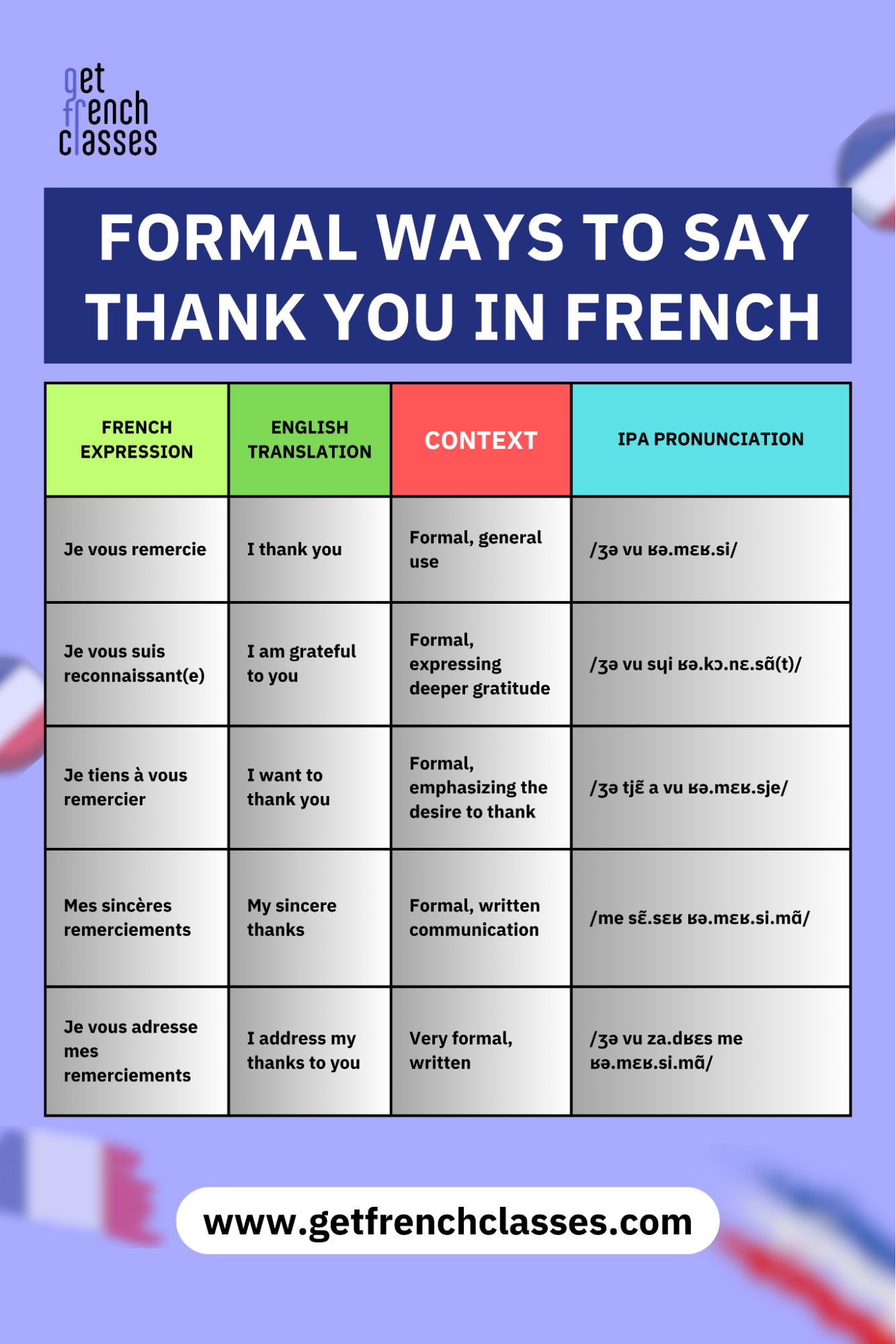
In formal situations, such as business meetings, official events, or when addressing people you don't know well or who are in positions of authority, it's important to use more polite and elaborate expressions of gratitude.
| French expression | English Translation | Context | IPA Pronunciation |
|---|---|---|---|
| Je vous remercie | I thank you | Formal, general use | /ʒə vu ʁə.mɛʁ.si/ |
| Je vous suis reconnaissant(e) | I am grateful to you | Formal, expressing deeper gratitude | /ʒə vu sɥi ʁə.kɔ.nɛ.sɑ̃(t)/ |
| Je tiens à vous remercier | I want to thank you | Formal, emphasizing the desire to thank | /ʒə tjɛ̃ a vu ʁə.mɛʁ.sje/ |
| Mes sincères remerciements | My sincere thanks | Formal, written communication | /me sɛ̃.sɛʁ ʁə.mɛʁ.si.mɑ̃/ |
| Je vous adresse mes remerciements | I address my thanks to you | Very formal, written | /ʒə vu za.dʁɛs me ʁə.mɛʁ.si.mɑ̃/ |
-
At a business meeting: " Je vous remercie pour votre présentation, elle était très instructive. I thank you for your presentation, it was very informative. This is a standard formal way to express gratitude in a professional setting.
-
After receiving significant help: " Je vous suis reconnaissant pour votre aide précieuse dans ce projet. I am grateful to you for your valuable help with this project. This expression conveys a deeper sense of gratitude, suitable for more significant gestures.
-
In a formal letter: " Je tiens à vous remercier pour votre généreuse donation à notre association. I want to thank you for your generous donation to our association. This phrase emphasizes the speaker's desire to express thanks, adding weight to the gratitude.
Casual and everyday thank you expressions in French
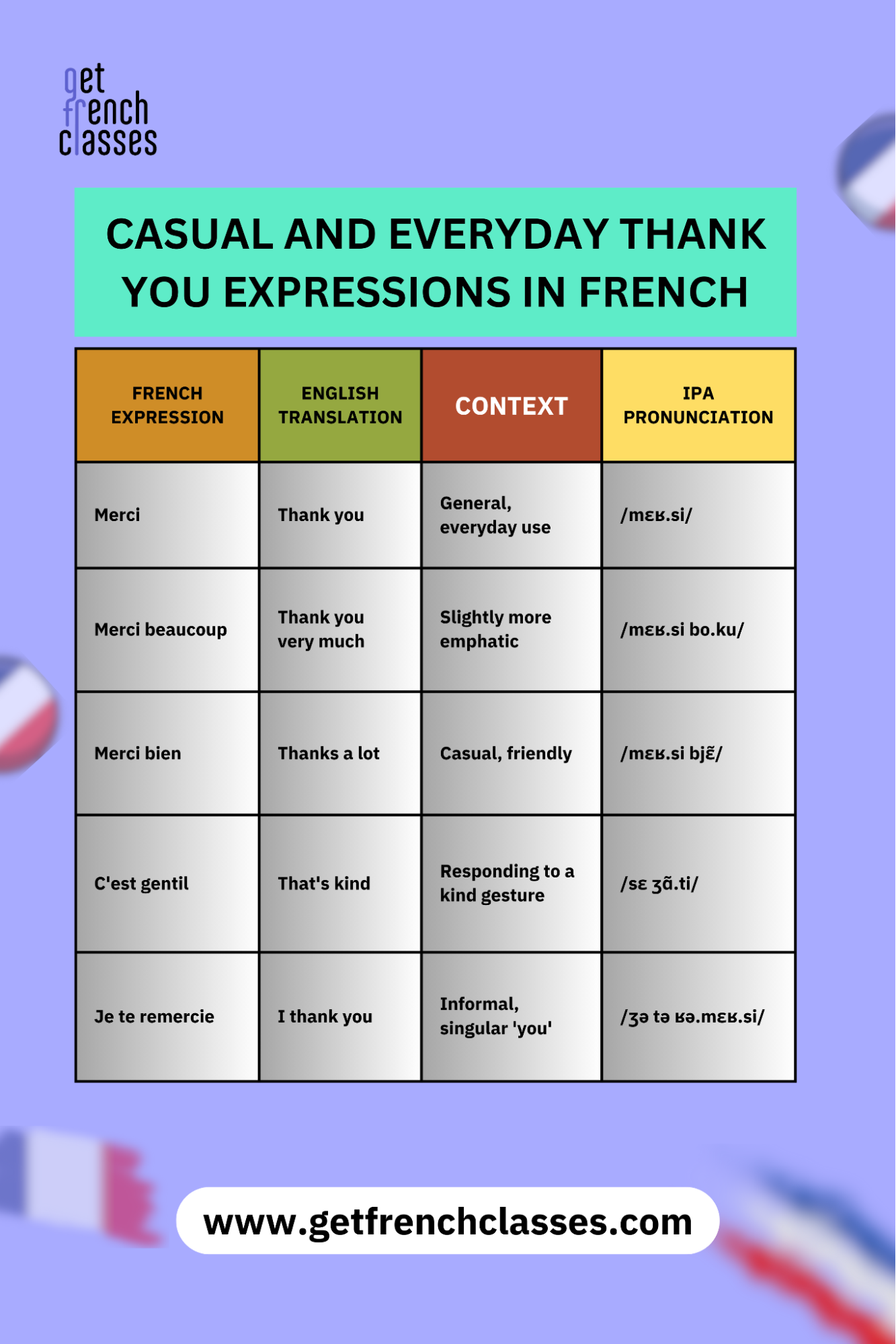
For everyday situations with friends, family, or in informal settings, you can use more relaxed expressions of gratitude.
| French expression | English Translation | Context | IPA Pronunciation |
|---|---|---|---|
| Merci | Thank you | General, everyday use | /mɛʁ.si/ |
| Merci beaucoup | Thank you very much | Slightly more emphatic | /mɛʁ.si bo.ku/ |
| Merci bien | Thanks a lot | Casual, friendly | /mɛʁ.si bjɛ̃/ |
| C'est gentil | That's kind | Responding to a kind gesture | /sɛ ʒɑ̃.ti/ |
| Je te remercie | I thank you | Informal, singular 'you' | /ʒə tə ʁə.mɛʁ.si/ |
-
When a friend passes the salt: "Merci!" This simple "merci" is perfect for everyday, minor interactions.
-
After receiving a gift from a family member: " Merci beaucoup, c'est vraiment super! Thank you very much, it's really great! This combination of "merci beaucoup" with an enthusiastic comment is common among friends and family.
-
When a colleague helps with a task: " C'est gentil de m'avoir aidé. It's kind of you to have helped me. This expression acknowledges the kindness of the act rather than just saying thanks.
-
Responding to a compliment from a friend: " Merci bien, c'est sympa de dire ça. Thanks a lot, it's nice of you to say that. "Merci bien" is a bit more casual and friendly than "merci beaucoup".
Expressing deep gratitude in French
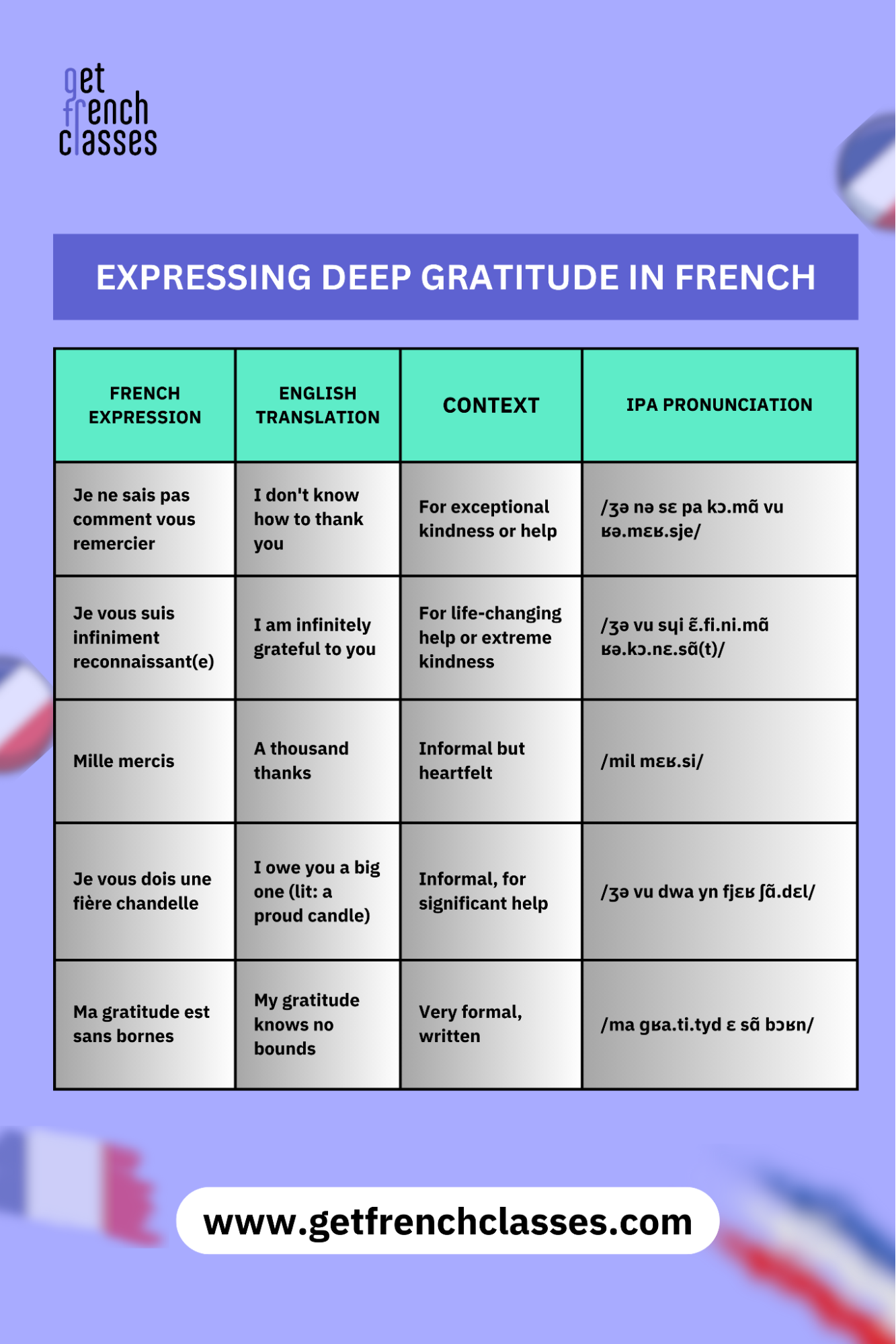
When you want to express profound gratitude or thankfulness for significant gestures or help, you can use these more elaborate and heartfelt expressions.
| French expression | English Translation | Context | IPA Pronunciation |
|---|---|---|---|
| Je ne sais pas comment vous remercier | I don't know how to thank you | For exceptional kindness or help | /ʒə nə sɛ pa kɔ.mɑ̃ vu ʁə.mɛʁ.sje/ |
| Je vous suis infiniment reconnaissant(e) | I am infinitely grateful to you | For life-changing help or extreme kindness | /ʒə vu sɥi ɛ̃.fi.ni.mɑ̃ ʁə.kɔ.nɛ.sɑ̃(t)/ |
| Mille mercis | A thousand thanks | Informal but heartfelt | /mil mɛʁ.si/ |
| Je vous dois une fière chandelle | I owe you a big one (lit: a proud candle) | Informal, for significant help | /ʒə vu dwa yn fjɛʁ ʃɑ̃.dɛl/ |
| Ma gratitude est sans bornes | My gratitude knows no bounds | Very formal, written | /ma ɡʁa.ti.tyd ɛ sɑ̃ bɔʁn/ |
Examples and explanations:
-
After someone helps you in a dire situation: " Je ne sais pas comment vous remercier pour m'avoir sauvé la vie I don't know how to thank you for saving my life. This expression conveys a sense of being overwhelmed by gratitude.
-
Thanking a mentor: " Je vous suis infiniment reconnaissant pour tout ce que vous m'avez appris. I am infinitely grateful to you for everything you've taught me. This phrase expresses deep, lasting gratitude for significant impact on one's life.
-
After receiving multiple favors from a friend: " Mille mercis pour tout ce que tu as fait pour moi cette semaine! A thousand thanks for everything you've done for me this week! "Mille mercis" is a more effusive way of saying thanks, suitable for multiple kindnesses. And one of its alternertive is "Merci mille fois".
-
When someone goes out of their way to help: " Je vous dois une fière chandelle pour votre aide avec ce projet. " ( I owe you a big one for your help with this project. ) This idiomatic expression indicates a sense of indebtedness for significant help.
Thank you in French slang and among youth
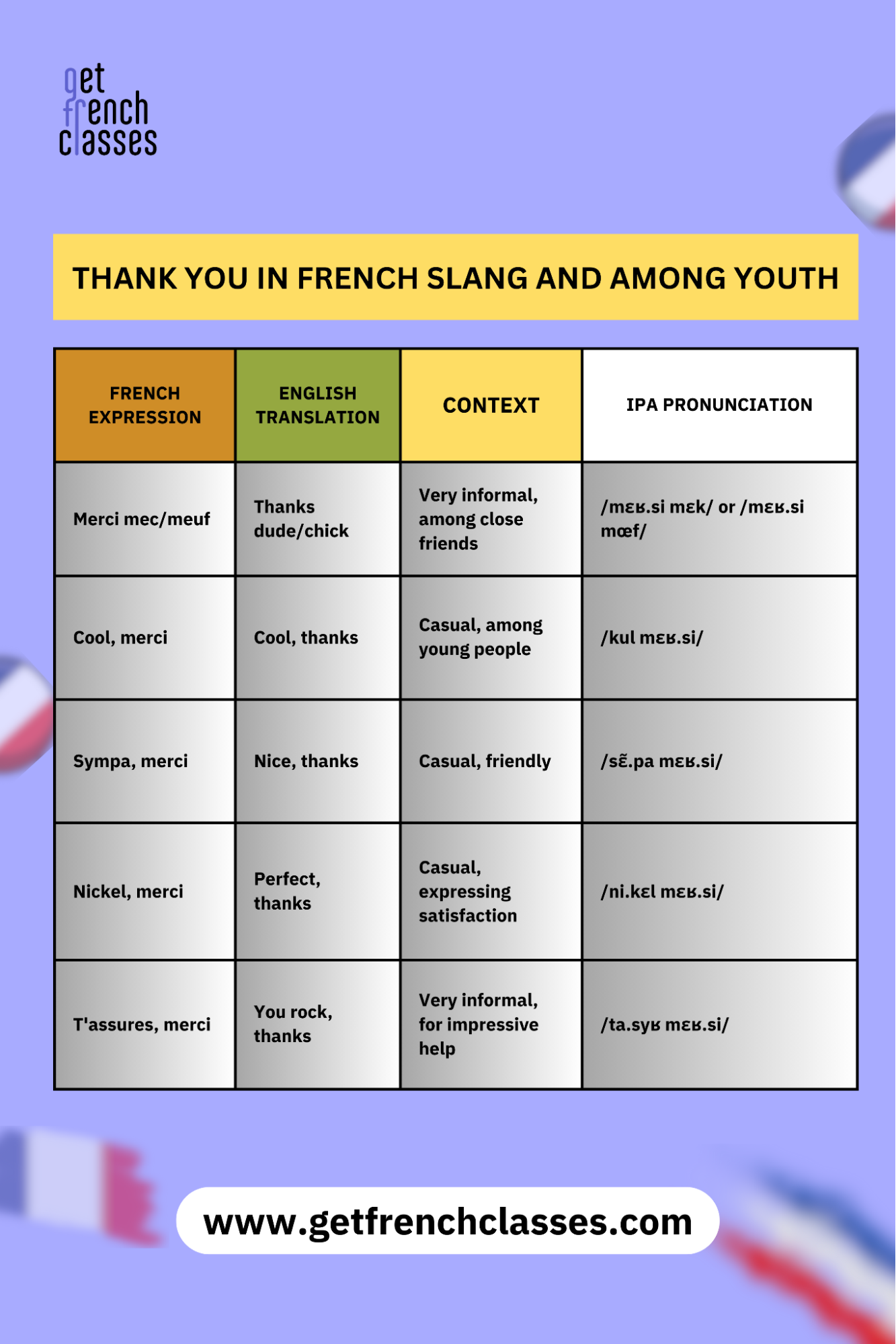
Younger French speakers and those in more casual settings often use slang expressions to say thanks. These are informal and should be used carefully, as they may not be appropriate in all contexts.
| French expression | English Translation | Context | IPA Pronunciation |
|---|---|---|---|
| Merci mec/meuf | Thanks dude/chick | Very informal, among close friends | /mɛʁ.si mɛk/ or /mɛʁ.si mœf/ |
| Cool, merci | Cool, thanks | Casual, among young people | /kul mɛʁ.si/ |
| Sympa, merci | Nice, thanks | Casual, friendly | /sɛ̃.pa mɛʁ.si/ |
| Nickel, merci | Perfect, thanks | Casual, expressing satisfaction | /ni.kɛl mɛʁ.si/ |
| T'assures, merci | You rock, thanks | Very informal, for impressive help | /ta.syʁ mɛʁ.si/ |
Examples and explanations:
-
A friend helps you move: " Merci mec, t'es un vrai pote! " ( Thanks dude, you're a true friend! ) "Mec" is a very casual way to address a male friend, similar to "dude" in English.
-
Someone passes you a drink at a party: " Cool, merci! "
This casual expression combines the English "cool" (widely used in French) with "merci".
-
A classmate shares their notes: " Sympa, merci! Tu me sauves la vie. " ( Nice, thanks! You're saving my life. ) "Sympa" is a shortened version of "sympathique" (nice), commonly used in casual speech.
-
When everything goes as planned: " Nickel, merci de tout coeur pour ton aide! " ( Perfect, thanks for your help! )
"Nickel" is slang for "perfect" or "great", often used to express satisfaction.
-
A friend does an exceptional job helping you: " Wow, t'assures! Merci à toi infiniment! Wow, you rock! Thanks infinitely!
" T'assures " (short for "tu assures") is a colloquial way of saying "you've got it covered" or "you rock".
Regional ways to say thank you in French-speaking countries
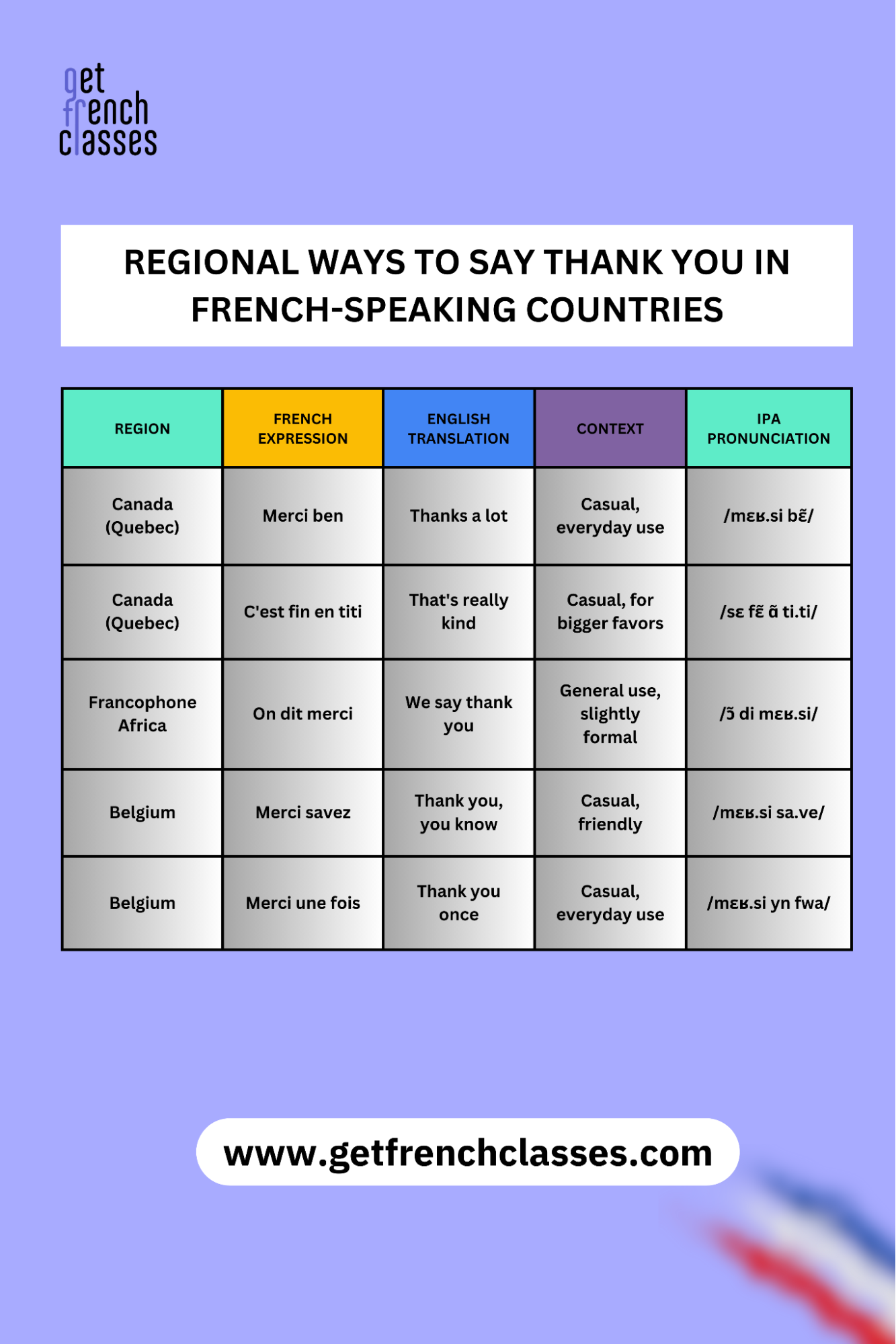
French is spoken in many countries around the world, and each region has developed its own unique expressions of gratitude. Let's explore some ways to say "thank you" in Canada (particularly Quebec), Francophone Africa, and Belgium.
| Region | French expression | English Translation | Context | IPA Pronunciation |
|---|---|---|---|---|
| Canada (Quebec) | Merci ben | Thanks a lot | Casual, everyday use | /mɛʁ.si bɛ̃/ |
| Canada (Quebec) | C'est fin en titi | That's really kind | Casual, for bigger favors | /sɛ fɛ̃ ɑ̃ ti.ti/ |
| Francophone Africa | On dit merci | We say thank you | General use, slightly formal | /ɔ̃ di mɛʁ.si/ |
| Belgium | Merci savez | Thank you, you know | Casual, friendly | /mɛʁ.si sa.ve/ |
| Belgium | Merci une fois | Thank you once | Casual, everyday use | /mɛʁ.si yn fwa/ |
Examples and explanations:
-
In Quebec, Canada: After a friend helps you with a task: " Merci ben, t'es un bon chum! Thanks a lot, you're a good friend!
"Merci ben" is a very common Quebec expression, where "ben" is a colloquial pronunciation of "bien" (well/good). Receiving a significant favor: " C'est fin en titi ce que t'as fait pour moi! That's really kind, what you did for me! "Fin en titi" is a uniquely Québécois expression meaning "really nice/kind". "Titi" is used for emphasis.
2. In Francophone Africa: In a slightly formal setting: " On dit merci pour votre hospitalité. We say thank you for your hospitality.
"On dit merci" is a common phrase in many African French-speaking countries, adding a communal feel to the expression of gratitude.
3. In Belgium: After receiving directions: " Merci savez, c'est gentil! Thank you, you know, that's kind!
"Savez" (you know) is often added to sentences in Belgian French for emphasis or to soften a statement. In everyday situations: "Merci une fois pour le café." (Thank you once for the coffee.) "Une fois" (once) is frequently added to sentences in Belgian French. It doesn't change the meaning but is a linguistic tic characteristic of the region.
It's important to note that while these expressions are common in their respective regions, they might not be understood or could sound unusual in other French-speaking areas. When in doubt, standard French expressions of gratitude are always a safe choice.
Thank you expressions for specific situations (Restaurants, Shops, etc.)
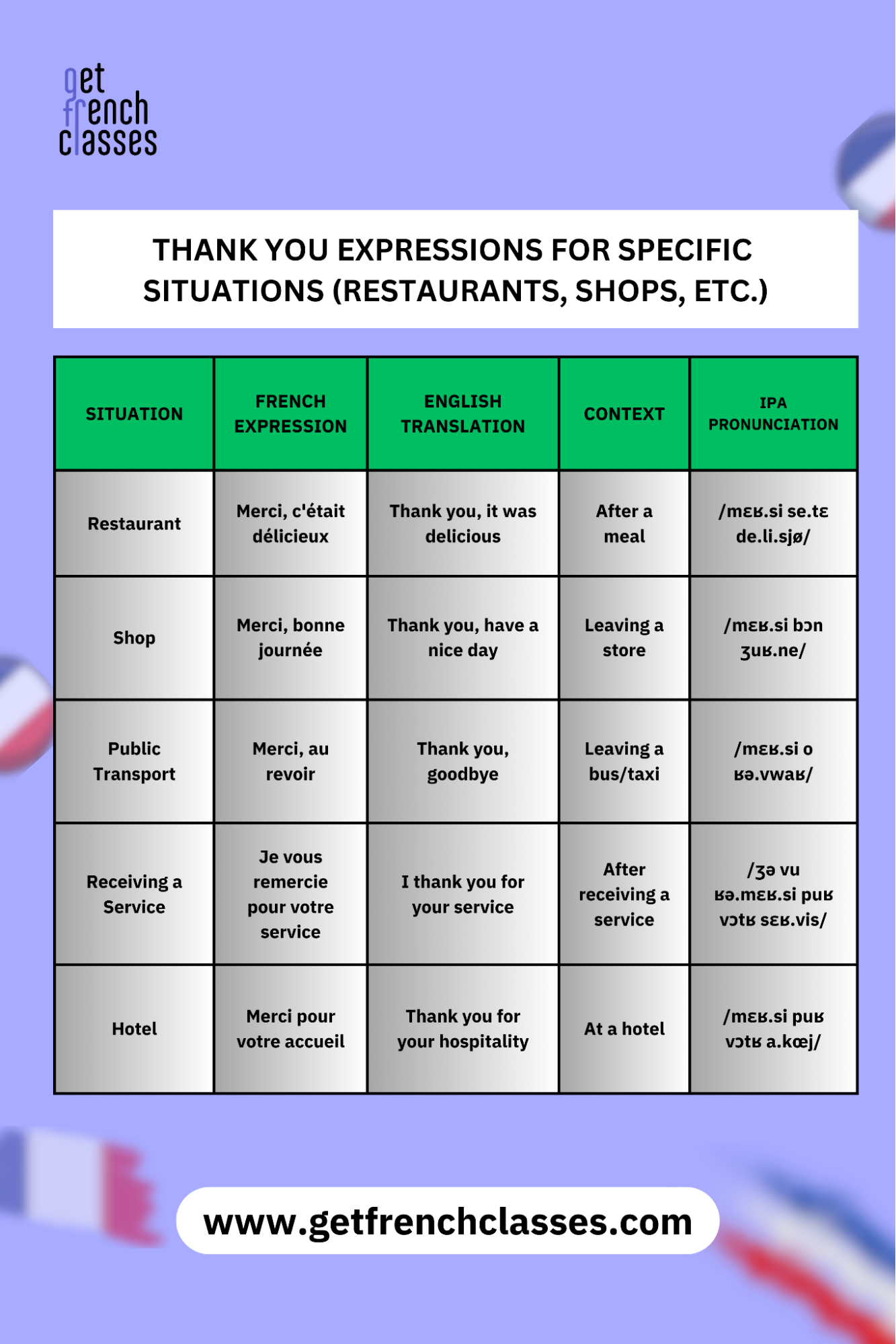
Different situations call for different ways of expressing gratitude. Here are some expressions tailored for specific contexts like restaurants, shops, and other common scenarios.
| Situation | French expression | English Translation | Context | IPA Pronunciation |
|---|---|---|---|---|
| Restaurant | Merci, c'était délicieux | Thank you, it was delicious | After a meal | /mɛʁ.si se.tɛ de.li.sjø/ |
| Shop | Merci, bonne journée | Thank you, have a nice day | Leaving a store | /mɛʁ.si bɔn ʒuʁ.ne/ |
| Public Transport | Merci, au revoir | Thank you, goodbye | Leaving a bus/taxi | /mɛʁ.si o ʁə.vwaʁ/ |
| Receiving a Service | Je vous remercie pour votre service | I thank you for your service | After receiving a service | /ʒə vu ʁə.mɛʁ.si puʁ vɔtʁ sɛʁ.vis/ |
| Hotel | Merci pour votre accueil | Thank you for your hospitality | At a hotel | /mɛʁ.si puʁ vɔtʁ a.kœj/ |
Examples and explanations:
-
At a restaurant after finishing your meal: " Merci, c'était délicieux. Mes compliments au chef! Thank you, it was delicious. My compliments to the chef!
This expression not only thanks the staff but also compliments the food, which is greatly appreciated in French culinary culture.
2. Leaving a shop after making a purchase: " Merci, bonne journée et à bientôt! Thank you, have a good day and see you soon!
Adding "à bientôt" (see you soon) is a friendly touch, especially if you're a regular customer.
3. Getting off a bus or leaving a taxi: " Merci, au revoir et bonne route! Thank you, goodbye and have a safe journey! "Bonne route" is a nice addition when thanking someone who will continue traveling.
4. After receiving a service (e.g., at a bank, post office): " Je vous remercie pour votre service. Vous m'avez beaucoup aidé. I thank you for your service. You've helped me a lot. This formal expression shows appreciation for the person's efforts in helping you.
5. Checking out of a hotel: " Merci pour votre accueil, notre séjour était très agréable. Thank you for your hospitality, our stay was very pleasant.
This expression acknowledges the overall experience, not just a single service.
Expressing thanks in written French (Letters, Emails)
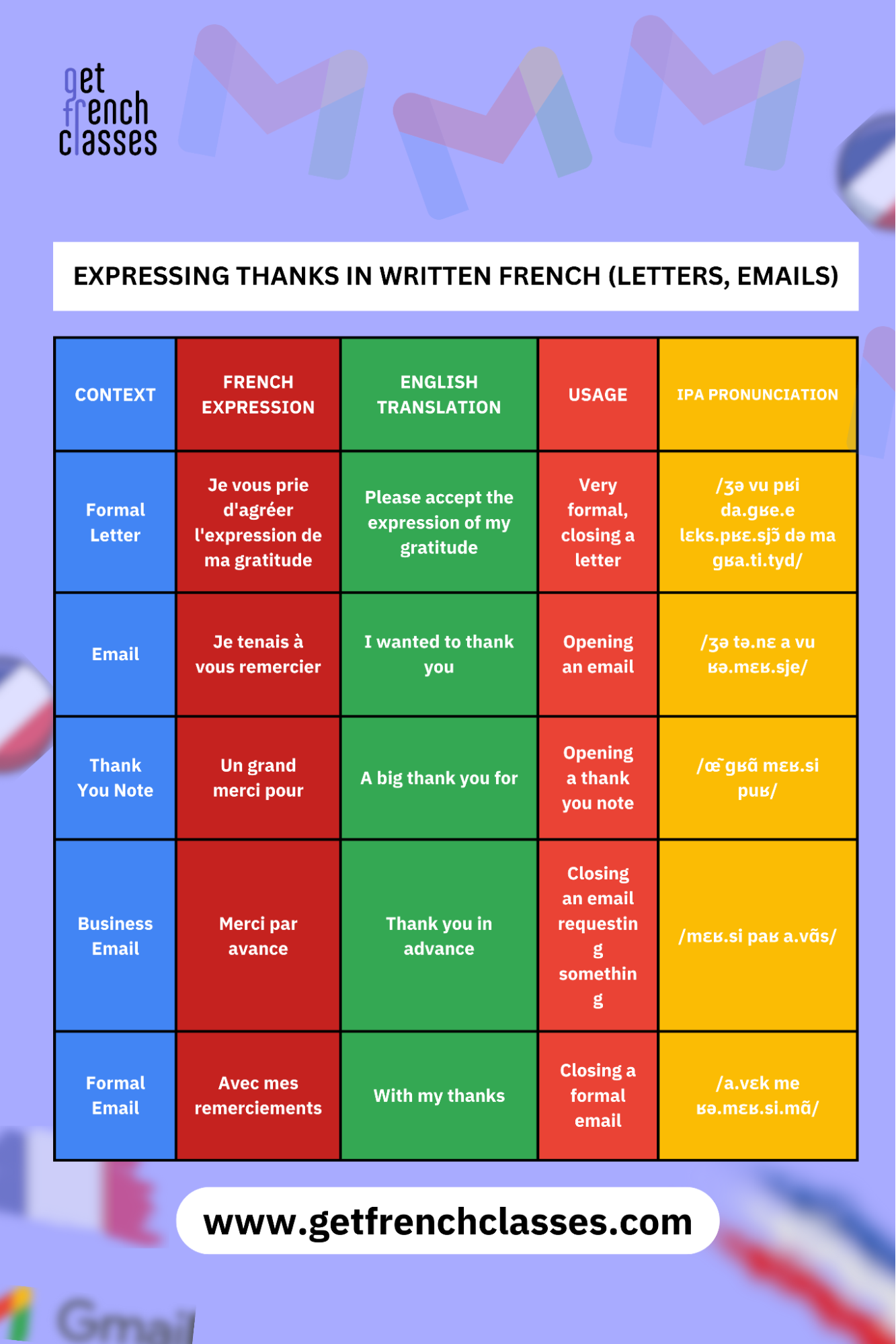
Written expressions of gratitude often require more formal language, especially in professional contexts. Here are some ways to express thanks in written French.
| Context | New Column 1 | English Translation | Usage | IPA Pronunciation |
|---|---|---|---|---|
| Formal Letter | Je vous prie d'agréer l'expression de ma gratitude | Please accept the expression of my gratitude | Very formal, closing a letter | /ʒə vu pʁi da.ɡʁe.e lɛks.pʁɛ.sjɔ̃ də ma ɡʁa.ti.tyd/ |
| Je tenais à vous remercier | I wanted to thank you | Opening an email | /ʒə tə.nɛ a vu ʁə.mɛʁ.sje/ | |
| Thank You Note | Un grand merci à \ pour | A big thank you to \ for | Opening a thank you note | /œ̃ ɡʁɑ̃ mɛʁ.si puʁ/ |
| Business Email | Merci d'avance | Thank you in advance | Closing an email requesting something | /mɛʁ.si paʁ a.vɑ̃s/ |
| Formal Email | Avec mes remerciements | With my thanks | Closing a formal email | /a.vɛk me ʁə.mɛʁ.si.mɑ̃/ |
Examples and explanations:
-
Closing a formal letter: " Je vous prie d'agréer, Madame, l'expression de ma profonde gratitude. " ( Please accept, Madam, the expression of my deep gratitude. ) This very formal expression is typically used at the end of official letters or in highly formal contexts.
-
Opening a thank you email: " Cher M. Dupont, Je tenais à vous remercier pour votre présentation lors de la conférence de la semaine dernière. " ( Dear Mr. Dupont, I wanted to thank you for your presentation at last week's conference. ) This is a polite way to begin an email expressing thanks in a professional context.
-
Writing a thank you note: " Un grand merci à vous pour votre généreux cadeau. Il nous a beaucoup touchés. " ( A big thank you for your generous gift. We were deeply touched. ) This warm expression is suitable for personal thank you notes.
-
Closing a business email where you're asking for something: " Merci par avance pour votre aide dans cette affaire. Cordialement, [Your Name] " ( Thank you in advance for your help in this matter. Best regards, [Your Name] )
"Merci par avance" is commonly used when you're thanking someone for something they haven't done yet.
5. Closing a formal email: " Avec mes remerciements les plus sincères, [Your Name] " ( With my most sincere thanks, [Your Name] )
This formal closing combines gratitude with a polite sign-off, suitable for professional or formal personal correspondence.
Remember, in written French, especially in formal contexts, it's important to match the level of formality in your opening and closing. The body of your message should also maintain a consistent tone
Responding to "Thank You" in French
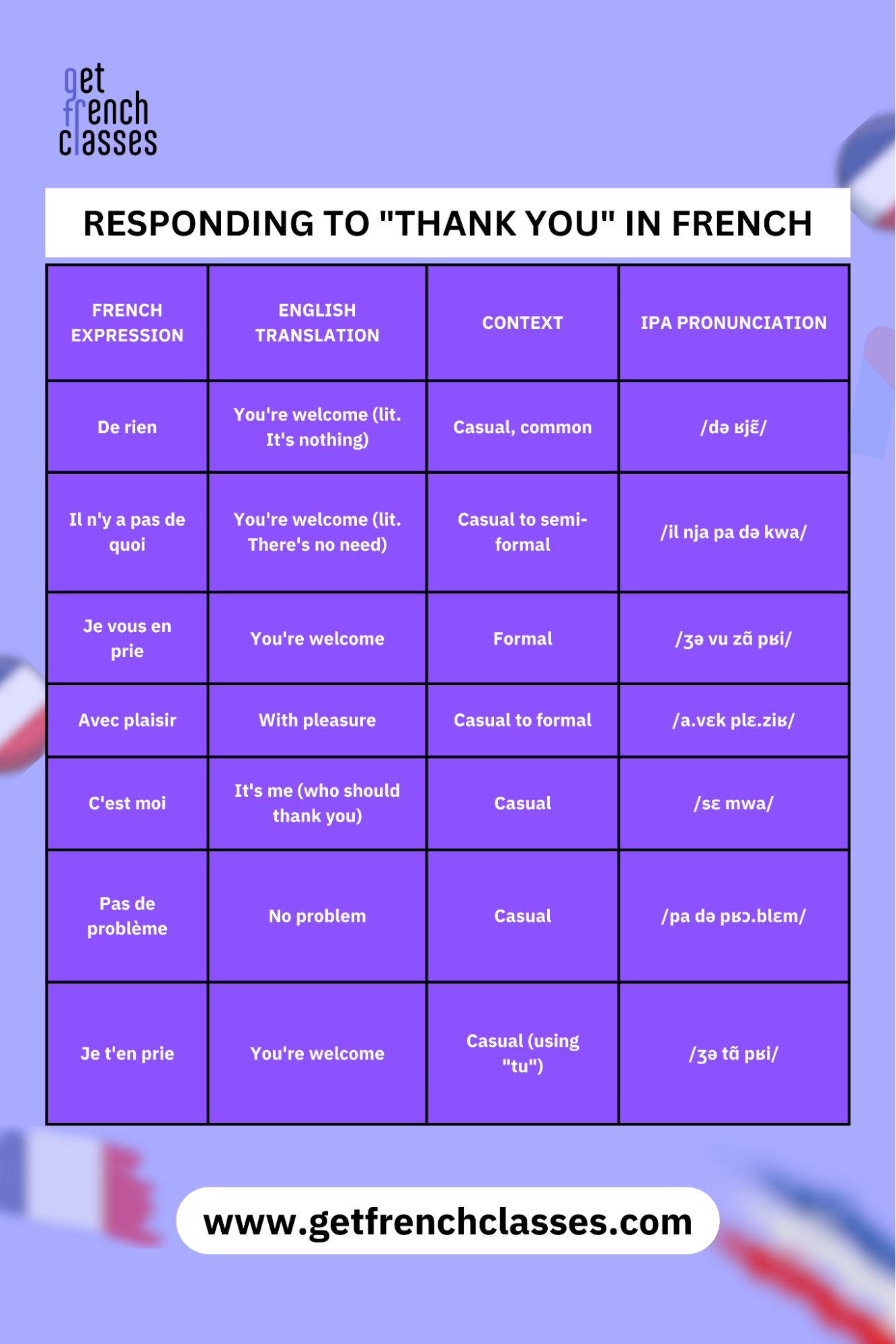
Knowing how to respond when someone thanks you is just as important as knowing how to express gratitude. In French, there are various ways to reply to "merci" or other expressions of thanks, depending on the context and level of formality.
| French expression | English Translation | Context | IPA Pronunciation |
|---|---|---|---|
| De rien | You're welcome (lit. It's nothing) | Casual, common | /də ʁjɛ̃/ |
| Il n'y a pas de quoi | You're welcome (lit. There's no need) | Casual to semi-formal | /il nja pa də kwa/ |
| Je vous en prie | You're welcome | Formal | /ʒə vu zɑ̃ pʁi/ |
| Avec plaisir | With pleasure | Casual to formal | /a.vɛk plɛ.ziʁ/ |
| C'est moi | It's me (who should thank you) | Casual | /sɛ mwa/ |
| Pas de problème | No problem | Casual | /pa də pʁɔ.blɛm/ |
| Je t'en prie | You're welcome | Casual (using "tu") | /ʒə tɑ̃ pʁi/ |
Note that none of these really mean "Welcome" in French, they simply mean "you're welcome."

Examples and explanations:
-
In a casual setting with friends:
-
Friend
Merci pour ton aide! " ( Thanks for your help! )
-
You
De rien, c'était un plaisir. " ( You're welcome, it was a pleasure. )
"De rien" is one of the most common and casual ways to respond to thanks.
2. In a more formal situation, such as at work:
-
Colleague
"Je vous remercie pour votre collaboration sur ce projet. " or "Tous mes remerciements pour votre collaboration" ( I thank you for your collaboration on this project. )
-
You
"Je vous en prie, c'était très intéressant. " ( You're welcome, it was very interesting. ) "Je vous en prie" is more formal and polite, suitable for professional settings.
3. When someone thanks you for a service:
-
Customer
Merci beaucoup pour votre aide. ” ( Thanks a lot for your help. )
-
You
Il n'y a pas de quoi, c'est mon travail. You're welcome, it's my job.
"Il n'y a pas de quoi" is versatile and can be used in both casual and semi-formal situations. It's worth mentioning that it's another way to reply if we don't want to say the well-known and usual "Je vous en prie" or "de rien"
4. Responding to thanks for doing a favor:
-
Friend
Merci d'avoir gardé mon chat ce week-end. With pleasure, he's adorable!
-
You
Avec plaisir, il est adorable! Thanks for looking after my cat this weekend.
"Avec plaisir" conveys that you were happy to help and enjoyed doing the favor.
5. In a very casual setting, possibly with a hint of humor:
-
Friend
Merci pour le café! Thanks for the coffee!
-
You
C'est moi qui te remercie pour ta compagnie. It's me who should thank you for your company. "C'est moi" is a playful way to deflect thanks and return the sentiment.
6. After helping with a small task:
-
Coworker :
" Merci d'avoir imprimé ça pour moi. " (Thanks for printing that for me.)
-
You
Pas de problème, ça ne m'a pris qu'une minute. " (No problem, it only took me a minute.)
"Pas de problème" is a casual way to say it was no trouble at all.
A little bonus : You could encounter some "merci pour tout" off and on. Well, you can say "merci pour tout" when expressing deep gratitude for everything someone has done. It's used in situations where someone has provided significant help, support, or kindness over time, not just for a single favor. It’s a heartfelt way to acknowledge a person's overall contribution or impact.
Last but not least, during french conversations, you could hear "Merci à tous" or "Merci à vous tous". It means "Thank you all" and is used to express gratitude to a group of people. It's appropriate when you want to thank everyone collectively for their support, participation, or contribution, whether it's in a personal, professional, or social setting. And if you want to extend your thank you to someone not present, you can say, "Dites la de ma part merci." (It's informal for, extend my thanks to her.)
The culture of gratitude in French-speaking countries
In French-speaking cultures, particularly in France, expressions of gratitude are generally used less frequently than in English-speaking countries, especially the United States. This doesn't indicate a lack of appreciation, but rather a different cultural approach to politeness and social interactions.
-
In service situations (shops, restaurants), a simple "merci" is often sufficient, without the need for effusive thanks.
-
Over-thanking or repeated thanks might be perceived as insincere or excessive in some French-speaking cultures.
-
However, when gratitude is expressed, it's often done with more intensity and elaboration, particularly in formal or significant situations.
Here are more nuances you need to know.
Expressing gratitude in French depending on formality and context
The level of formality in expressing gratitude is crucial in French-speaking cultures:
-
The use of "tu" (informal you) vs. "vous" (formal you) significantly impacts how gratitude is expressed.
-
In professional or formal settings, more elaborate expressions of thanks are expected, often accompanied by formal language and titles.
-
Among friends and family, expressions of gratitude are more relaxed but still important.
Saying thank you in French using non-verbal expressions
Gratitude in French-speaking cultures isn't always verbal:
-
In France, the practice of "la bise" (kissing on the cheeks) can be a way of expressing thanks in personal settings, though this varies by region and relationship.
-
A sincere smile and eye contact often accompany verbal thanks, emphasizing genuine appreciation.
-
In some African French-speaking countries, a slight bow or hand gesture might accompany verbal thanks.
Saying thank you in French in the context of reciprocity and social obligations
The concept of reciprocity is important in French-speaking cultures:
-
When invited to someone's home, bringing a small gift (like flowers or wine) is a common way to express gratitude.
-
After receiving hospitality, it's customary to send a thank you note or make a phone call expressing appreciation.
-
The phrase "à charge de revanche" (I owe you one) is often used, indicating an understanding that favors should be reciprocated.
Expressing gratitude in French depending on the regions
Gratitude customs can vary significantly across French-speaking regions:
-
In Quebec, expressions of thanks might be more frequent and casual compared to France.
-
In some African French-speaking countries, gratitude might be expressed more communally, reflecting local cultural values.
-
Belgian French speakers might use unique local expressions to convey thanks, reflecting their distinct cultural identity.
Saying thank you in French in business and professional settings
In professional contexts, expressing gratitude follows specific norms:
-
Written thank-you notes or emails are common and expected after job interviews, business meetings, or receiving professional favors.
-
In business settings, expressing gratitude often goes hand in hand with maintaining professional relationships and networking.
The role of modesty in responding to a thank you in French
French culture, in particular, values modesty in receiving thanks:
-
When thanked, it's common to downplay one's efforts with phrases like "C'est normal" (It's normal) or "C'est rien" (It's nothing).
-
This doesn't indicate a lack of appreciation for the thanks, but rather a cultural tendency to avoid appearing boastful.
Teaching gratitude to the younger generation
In French-speaking cultures, teaching children to express gratitude is an important part of social education:
-
Children are often prompted with "Qu'est-ce qu'on dit?" (What do we say?) to remind them to say "merci."
-
Learning when and how to express thanks appropriately is considered a key aspect of a child's social development.
Understanding these cultural nuances helps in navigating social interactions in French-speaking countries more effectively.
Common mistakes to avoid when saying thank you in French
When expressing gratitude in French, there are a few significant mistakes that non-native speakers often make.
Being aware of these can help you convey your thanks more authentically and appropriately. Let's focus on three major pitfalls to avoid:
1. Overusing "Merci"
Mistake : Saying "merci" excessively or repeatedly in a single interaction.
Why it's a problem : While "merci" is indeed the most common way to say thank you, using it too frequently can sound unnatural in French. French speakers generally use "merci" more sparingly than English speakers use "thank you."
How to avoid it : Use "merci" once in an interaction, and if you want to express more gratitude, elaborate with a phrase or compliment instead of repeating "merci." For example, after saying "merci" once, you could add " C'est très gentil de votre part " ( That's very kind of you ) or " J'apprécie beaucoup " ( I really appreciate it ).
Example : Instead of: "Merci, merci beaucoup, merci encore!" Better: "Merci, c'est vraiment gentil. J'apprécie votre aide."
2. Incorrect Formality Level
Mistake : Using informal expressions in formal situations or vice versa.
Why it's a problem : French has distinct formal and informal registers, and using the wrong one can be seen as disrespectful or inappropriately casual, depending on the context.
How to avoid it : Pay attention to the context and your relationship with the person. Use "Je vous remercie" in formal situations and with people you don't know well, and reserve "Merci" or "Je te remercie" for informal situations with friends, family, or peers.
Example: Formal (with a superior or stranger): "Je vous remercie pour votre aide, Madame." Informal (with a friend): "Merci pour ton aide, c'est sympa!"
3. Neglecting Context-Appropriate Expressions
Mistake : Using the same expression of gratitude in all situations, regardless of the context or the magnitude of what you're thanking someone for.
Why it's a problem : In French culture, the way you express gratitude often needs to match the situation. Using a casual "merci" for a significant favor or an overly formal expression for a small gesture can seem odd or insincere.
How to avoid it : Learn a range of gratitude expressions and use them appropriately based on the context. For small favors, a simple "merci" is often enough. For more significant help, use more elaborate expressions.
Examples : For a small favor: "Merci" or "C'est gentil" For significant help: "Je vous suis très reconnaissant(e)" or "Je ne sais pas comment vous remercier" In a formal letter: "Je vous prie d'agréer l'expression de ma sincère gratitude"
French expressions of gratitude other than "Merci"
Want to sound like a native French speaker in your way of saying thank you? Here are a few expressions the French use on everyday conversations:
-
" C'est très aimable à vous " ( That's very kind of you )
This phrase expresses appreciation for someone's kindness without directly saying "thank you."
-
" Je vous/te suis reconnaissant(e) " ( I am grateful to you ) A more formal way to express deep gratitude, often used for significant favors or help.
-
" Je ne sais pas comment vous remercier " ( I don't know how to thank you ) Used to express overwhelming gratitude, implying that a simple "merci" isn't enough.
-
" C'est trop gentil " ( That's too kind ) A common response to a generous act or gift, expressing that the person has gone above and beyond.
-
" Ça me fait plaisir " ( It makes me happy ) While typically used as a response to thanks, saying this after receiving something can indirectly express your gratitude.
-
" Je n'oublierai jamais ce que vous avez fait pour moi " ( I'll never forget what you've done for me ) A powerful way to express lasting gratitude for significant help or kindness.
-
" Vous êtes un ange " ( You're an angel ) An affectionate way to express gratitude, implying that the person's help was heaven-sent.
-
" Je vous/te revaudrai ça " ( I'll return the favor ) While promising to reciprocate, this also acknowledges and expresses appreciation for what the other person has done.
-
" C'est très apprécié " ( It's very appreciated ) A somewhat formal way to express gratitude, often used in professional contexts.
-
" Chapeau! " ( Hats off! ) While not directly expressing thanks, this exclamation of admiration can be used to show appreciation for someone's actions or achievements.
Here are some more examples of ways to say thank you that go beyond a simple “Merci”:

How to Say Thank You in French FAQ
Is it rude not to say "merci" in French?
While it's generally polite to say "merci" when receiving something or when someone does something for you, French culture doesn't always require verbal thanks for every small interaction. In some casual or routine situations, a smile or nod might suffice. However, omitting "merci" in situations where it's clearly warranted (like receiving a gift or substantial help) would indeed be considered rude. When in doubt, it's always safer to say "merci."
How do you express gratitude for a gift in French?
When receiving a gift in French culture, you can express gratitude in several ways:
-
" Merci beaucoup pour ce cadeau " ( Thank you very much for this gift )
-
" C'est très gentil à vous, je vous remercie " ( That's very kind of you, I thank you )
-
" Il ne fallait pas ! Merci infiniment " ( You shouldn't have! Thank you infinitely )
-
" Ça me fait vraiment plaisir, merci This really makes me happy, thank you
Remember to show genuine appreciation through your tone and body language as well.
Are there any gestures that accompany saying thank you in French culture?
While verbal expression is the primary way of showing gratitude in French culture, there are some gestures that can accompany or sometimes replace a verbal "merci":
-
A sincere smile is often accompanied with a verbal "merci."
-
A slight nod of the head can emphasize your verbal thanks.
-
In more personal settings, "la bise" (cheek kisses) might be used to express thanks, especially for more significant gestures of kindness.
-
A handshake might accompany a thank you in more formal or professional settings.
However, it's important to note that French culture generally relies more on verbal expression of gratitude than on physical gestures.
How do French-Canadians say thank you differently from the French?
While the basic "merci" is the same, there are some differences in how French-Canadians, particularly Québécois, express gratitude compared to Metropolitan French:
-
"Merci beaucoup" is more commonly used in Quebec than in France for everyday situations.
-
"Merci ben" is a very common informal way to say "thanks a lot" in Quebec French.
-
The expression "C'est fin" (It's nice) is often used in Quebec to express appreciation, whereas it's not commonly used this way in France.
-
In Quebec, you might hear "Ça fait plaisir" as a response to thanks more often than in France.
Generally, Quebec French tends to use expressions of gratitude more frequently in day-to-day interactions compared to Metropolitan French.
When should you use "Je vous remercie" instead of "Merci"?
"Je vous remercie" is a more formal and elaborate way of saying thank you in French. You should use it in the following situations:
-
Formal settings: In professional environments, with superiors, or in official correspondence.
-
When addressing someone you don't know well or someone older than you, as a sign of respect.
-
For significant favors or help: When someone has gone out of their way to assist you.
-
In written communication: It's often used in formal emails or letters.
-
When you want to emphasize your gratitude: "Je vous remercie" can carry more weight than a simple "merci."
As you've come to the best place to learn and speak french , here is another another bonus for you: If you want to express your sincere gratitude in French, you can sometimes use the expression "merci beaucoup" (thank you very much). To be more formal and polite, you can also say "je vous remercie beaucoup" (I thank you very much).
Hope you've enjoyed learning some formal and informal phrases.
Remember, "Je vous remercie" uses the formal "vous" form. In informal situations with friends or family, you would use "Je te remercie" if you want to use this more elaborate form of thanks.
